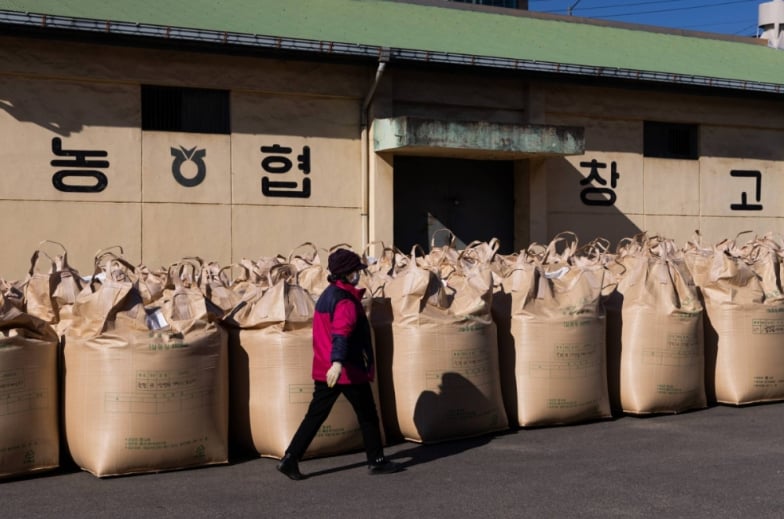June 16, 2025 | 19:37 GMT +7
June 16, 2025 | 19:37 GMT +7
Hotline: 0913.378.918
June 16, 2025 | 19:37 GMT +7
Hotline: 0913.378.918

Bags of rice at a warehouse in Pyeongtaek, South Korea. Japan imported South Korean rice for the first time since 1999 this month amid soaring domestic prices for the staple grain. | BLOOMBERG.
Japan imported South Korean rice for the first time since 1999 this month as soaring prices of domestic grain fueled demand for foreign products despite heavy tariffs, a South Korean industry official said Monday.
The imports were made via the Japan office of South Korea’s National Agricultural Cooperative Federation, better known as NongHyup, which said it brought in and sold 2 tons of Korean rice online and at local supermarkets this month.
While the amount accounts for a sliver of Japan’s consumption, it offers a bright spot for South Korea’s overall exports, which were slammed in April by U.S. President Donald Trump’s protectionist trade policies. It also comes at a time when Asian countries are seeking to improve trade ties with one another to overcome Trump’s efforts to upend global trade. Last month, the trade chiefs of South Korea, China and Japan met in Seoul and renewed their call for free trade.
Korean rice had not had a price advantage because of tariffs previously but it’s competitive now, an official at NongHyup’s Tokyo office said by phone, wishing to remain anonymous due to the sensitivity of the situation. The person added that it was the first such sale since NongHyup opened its Tokyo office.
The Nonghyup official said the initial shipments of 2 tons have already been sold out and 20 additional tons were scheduled to arrive by next week.
Japan levies around ¥340 ($2.40) per kilogram on rice imports that exceed a duty-free quota of about 770,000 metric tons a year, and Japanese consumers’ preferences for domestic grain and the country’s convoluted supply chain have also complicated imports.
But consumer rice price jumped 92% last month from a year earlier, the fastest pace of increases since 1971 and accelerating inflation, according to data from Japan’s internal affairs ministry.
japantimes

(VAN) The UNESCO Global Geopark revalidation of Non nuoc Cao Bang and the transition to a two-tier administrative model are presently undergoing a pivotal moment in Cao Bang, the northernmost province of Vietnam.
/2025/06/13/5330-2-004539_953.jpg)
(VAN) Changing policy mindset and removing investment barriers are urgent requirements to open up new development space for enterprises in the agricultural sector.

(VAN) The areas include the restoration of five million hectares of marine ecosystems.

(VAN) Dr. Le Van Nguyen, Director of the Institute of E-Commerce Management (ECM), emphasizes the potential for green development through the cultivation of fruit trees, particularly in provinces such as Son La.

(VAN) VAAS and numerous Vietnamese enterprises have signed cooperation agreements with Japanese partners to promote agricultural technology and trade connectivity.
/2025/05/29/5625-12-214801_567.jpg)
(VAN) Provincial mergers in the Mekong Delta promise to streamline administration, expand inter-provincial raw material areas, and foster close linkages in agricultural value chains, benefiting both businesses and cooperatives.

(VAN) Merging Mekong Delta provinces contributes to the expansion of agricultural raw material areas, addressing previous constraints caused by provincial boundaries. Additionally, this expansion will reduce costs and strengthen linkages between businesses, cooperatives, and farmers.